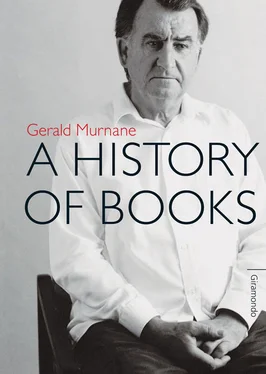The wreath of fig leaves that is part of this piece of fiction became brown and withered after a few days. Afterwards, the leaves seemed so brittle whenever I looked up at them that I was often afraid some of them might crumble and fall as a result of the vibrations from our hymn singing of an evening. I was afraid that this would oblige Nunkie to have to explain to his son and to me that European people were able to make Advent wreaths that stayed green for much longer than ours had stayed, which was something that I might have found hard to believe, although I would never have said so.
All the settlers at Grasslands were unmarried. The founder of the settlement might have been only dimly aware of the power of sexual attraction between men and women, but he himself had for some years past felt a strong attraction towards one or another female person, which attraction he thought of as a falling in love, even though the female person was sometimes of a different age than his. Accordingly, the founder had designed the settlement so that females and males lived at opposite ends of the place, with the chapel, the library, and all the farm buildings between. They mostly worked at separate tasks, but they met for meals and for prayers of the divine office, which they recited during their several visits to the chapel each day. This chapel was so arranged that the males and females faced each other, with each sex occupying a set of stalls to the side of the building. Males and females were permitted to look freely at each other. The founder expected that many a male would feel attracted to one or another female, but he supposed that such a male would be affected as he, the founder, would have been affected in such circumstances: the male would be continually inspired by the image in his mind of the face of the female as she appeared in the chapel or in the dining room; he would work more strenuously in the paddocks in order to impress her; he would study harder in the library so that he could discuss theology and philosophy with her. In the fullness of time, every male settler would be continually aware of the face and person of a young woman who was sometimes visible on the opposite side of the chapel or the dining room and was at other times an inspiring image in his mind.
One of the explanations that I heard long afterwards for the failure of the settlement of Outlands was that the bishop of the diocese where the settlement was situated would never allow any of his priests to be stationed as chaplain in a place where the presence together of unmarried males and females might have given rise to scandal among non-Catholic neighbours. The Outlanders had tried by every possible means, so I was told long afterwards, to obtain a chaplain. They had drawn up an eloquent petition at one time, and a number of them had travelled by horse and cart — their only available transport — from Outlands to the palace of the bishop, which palace was in a suburb of the city that was named Bassett in my first published work of fiction. The Outlanders had travelled for two weeks and had arrived tired and dishevelled at the bishop’s palace, but he had rejected their petition.
This piece of fiction is as it were a letter to a man who was mentioned earlier in the fiction. As soon as I have finished the final draft of this fiction, I will send a copy to the man just mentioned. I mentioned this now rather than at the end of the fiction so as not to lessen whatever effect the last pages might have or to suggest that the whole piece is anything but a piece of fiction. While I was writing the previous paragraph, I intended to put marks beside that paragraph in the copy that I sent to the man mentioned above so that the man would not fail to note that a party of dishevelled Outlanders must have passed close by the house where he lived in the first year of his life. I understand now, however, that my having written the previous sentence relieves me of the need to put any marks in the margin of this text.
No one at the Farm knew about the settlement of Grasslands. I was not anxious to keep the place secret, but I was mostly clearing the forest and building the buildings and keeping the twig-persons active during the daytime, while Nunkie and my cousin were away. Sometimes one of the young men or women from Outlands would be sitting with a book on the veranda or strolling up and down beside the house — praying, perhaps, or even meditating — and would ask me later what I had been doing out in the long grass. I would tell the questioner a half-truth: that I had a toy farm in the grass.
Grasslands had been already well established when a certain young woman arrived for the first time at the Farm. I shall call the certain young woman hereafter the Pretty-faced Woman. Perhaps I might not consider her so pretty if I saw her likeness today, but in the last month of 1950 she was the prettiest young woman I had seen. She was on her way to or from Outlands, busy on some secular or spiritual errand that I could never hope to know about. She bustled through the quiet rooms at the Farm, talking softly and earnestly to Nunkie or the Holy Foundress. Her noticeable breasts swung often behind her blouse. Her dark blue eyes and dark brown hair went strangely together. I stared often at the pale freckles above the high neckline of her dress.
The Pretty-faced woman was different from the other young women from Outlands not only because she was pretty and they were plain but because she seemed more curious about me. She asked me who I was, how I was connected with the persons at the Farm, where my home was, why I was living away from my family. She asked these things as though she was truly interested.
On the day after the Pretty-faced Woman had arrived at the Farm, I looked through the branches of the fruit trees at the Farm in search of a twig to represent a new settler at Grasslands. The females at Grasslands were by no means all plain Janes; some of their faces had already begun to inspire some of the male settlers. But I had taken no special care in choosing any of the twigs that represented the females. Now, I found a twig with a certain shapeliness and symmetry and with a certain smoothness when the bark had been peeled away from the paler wood beneath. I placed this twig among the other representations of female settlers and looked forward to a series of events that would soon take place at Grasslands, the first of which events would be a long exchange of looks between the twig that represented myself and the twig that represented the new arrival when the settlers were next gathered in the chapel.
I did the things mentioned above on the morning of the day mentioned above. After lunch on that day, I was only just settling myself on my knees beside the settlement of Grasslands when I heard someone walking up behind me through the long grass.
I was a child, but I did not lack guile. I went on staring ahead. I pretended not to have heard her footsteps behind me. I sat back on my thighs and stared ahead of me as though I was contemplating fold after fold of an endless landscape. She remained for a short while a female presence just out of sight behind me, and then she stepped forward and asked me what I would have expected any visitor to the Farm to ask about my dirt clearings, my lumps of cracked mud, and my forked twigs standing crookedly here and there.
I told her as much of the truth as she needed to be told: that I had founded a settlement in a remote place; that I had been inspired by the example of Outlands, even though I had only heard a little about it…
She reached down and drew her fingers through my hair and then told me she hoped to welcome me one day to Outlands, which was still hardly bigger than my own settlement in the grass but which would grow and thrive. And then she went back to the house.
After she had gone, I began to modify somewhat my original ground plan for Grasslands. Somewhere at the edge of the settlement there would have to be space for a house, and perhaps a small garden, for the first two of the settlers who were a married couple. Later, other such houses would be needed for other couples and their children. But these plans of mine were never carried out. On the next day, my father arrived without notice at the Farm. The electricity had been switched on in the partly built house on the far side of Melbourne where my parents and my sister and I were going to live happily together during the foreseeable future. (In fact, we lived there for four years, until my father, who had become for several years a reformed gambler, became again a gambler and had to sell the house in order to pay his latest debts.)
Читать дальше












